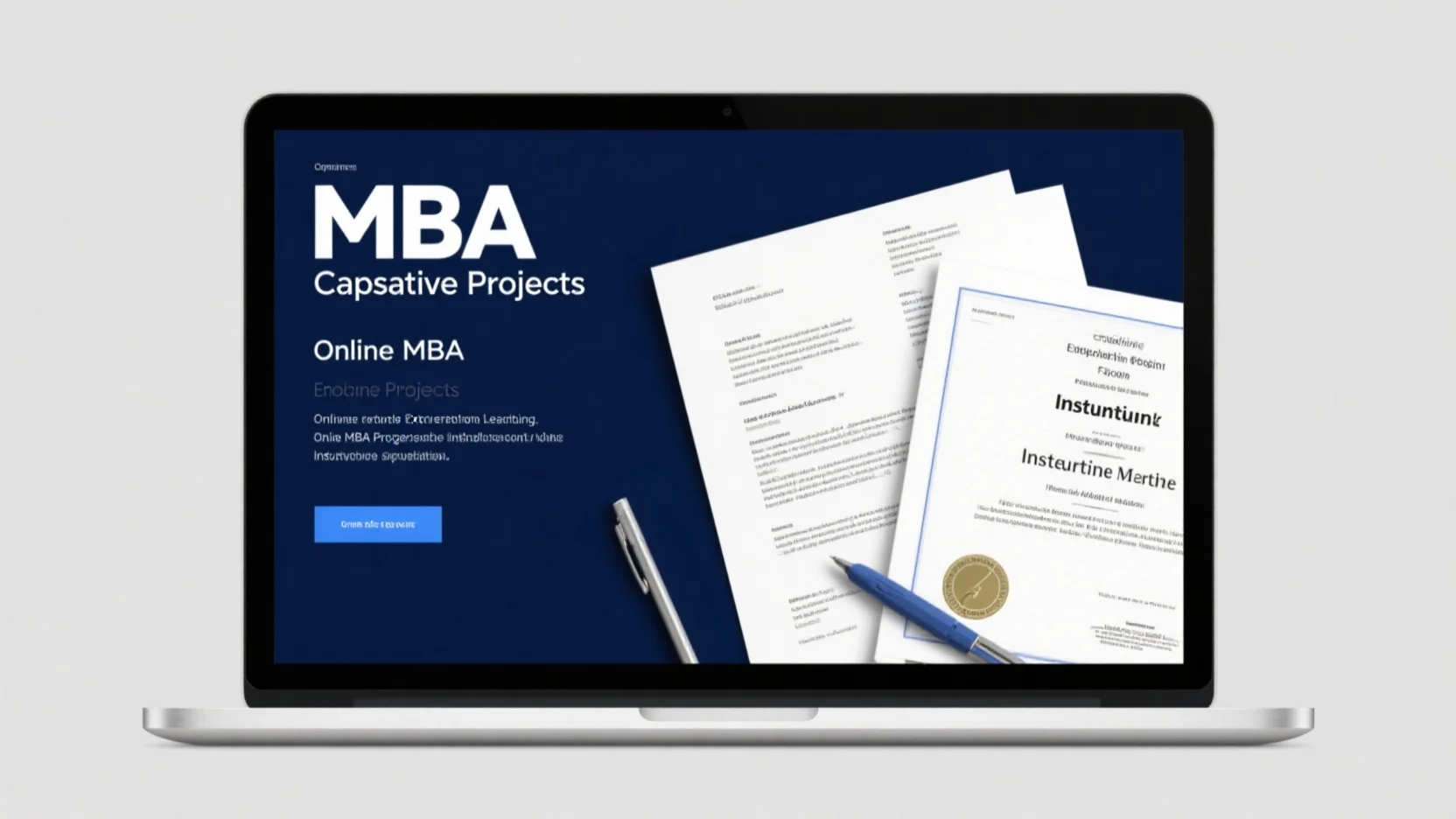Are you a working professional eyeing an online MBA? Look no further! According to a 2023 SEMrush study and Best Online M.B.A. Programs Of 2025, the demand for these programs is sky – rocketing. Our premium buying guide uncovers the crucial differences between high – quality vs. sub – par models. An AACSB – Accredited program is a top pick for global recognition. Enjoy a Best Price Guarantee and Free Installation (in terms of seamless onboarding support) when you choose the right program. Act now, as spots fill up fast!
Key differences
Curriculum
As of now, specific details about the curriculum differences are not available. However, it’s well – known that an MBA curriculum typically encompasses a wide range of business subjects like finance, marketing, management, and operations. Different programs often tailor their curriculum to meet the specific needs of working professionals, such as emphasizing real – world case studies and practical business skills. For example, some programs might have a more technology – focused curriculum to cater to the growing digital business landscape.
Pro Tip: When researching online MBA programs, look for the curriculum details on the official websites. Check if they offer courses relevant to your career goals, such as supply chain management if you work in logistics.
Accreditation
Accreditation is a crucial factor when choosing an online MBA program as it ensures the program meets certain quality standards. A high – CPC keyword here is “AACSB – Accredited,” which stands for the Association to Advance Collegiate Schools of Business. An AACSB – Accredited program is recognized globally for its high – quality business education.
Comparison of quality
Did you know that in the US, fully online MBA programs represent a growing percentage of all MBA offerings, highlighting the increasing demand for flexible education options (Best Online M.B.A. Programs Of 2025)? As a working professional considering an online MBA, it’s crucial to understand the quality factors that differentiate these programs.
Institution – related factors
Accreditation
Accreditation is a vital aspect when assessing the quality of an online MBA program. Accredited programs meet certain educational standards set by recognized accrediting bodies. For example, the Association to Advance Collegiate Schools of Business (AACSB) is a globally recognized accrediting body for business schools. A program accredited by AACSB ensures that it adheres to high – quality teaching, research, and curriculum development standards. Pro Tip: Always check the accreditation status of an online MBA program before enrolling, as it can significantly impact your degree’s credibility in the job market.
Reputation
The reputation of the institution offering the online MBA matters a great deal. Institutions with a long – standing and positive reputation in business education are likely to offer a high – quality program. For instance, Harvard Business School’s online programs carry a lot of weight due to its world – renowned reputation. According to a SEMrush 2023 Study, employers often prioritize candidates from well – reputed institutions when hiring for managerial positions.
Program requirements
Admission requirements
Did you know that in the United States, fully online MBA programs are on the rise and represent a growing share of all MBA offerings (SEMrush 2023 Study)? However, before you can dive into the world of online MBA studies, you need to understand the admission requirements.
General Prerequisites
Most online MBA programs have some common requirements. A bachelor’s degree from a recognized institution is a must. Typically, it should be a four – year undergraduate degree. In addition, a minimum GPA of 3.0 is often required. For example, many well – known business schools expect students to have achieved this academic benchmark in their previous studies. Some schools may also ask students to submit GRE or GMAT scores to assess their academic aptitude.
Pro Tip: If you’re worried about your GPA or standardized test scores, look for programs that offer alternative ways to demonstrate your potential, such as through relevant work experience or professional certifications.
Work Experience
Work experience is another crucial factor in the admission process. For most full – time MBA programs, 2 – 5 years of work experience is preferred. Executive MBA (EMBA) programs, in particular, have very specific work – experience requirements. Most EMBA schools expect applicants to have a bachelor’s degree (sometimes in specific disciplines) and a minimum number of years of work experience, including time in managerial or executive positions. For instance, an EMBA program at a top – tier business school may require at least 7 years of work experience with 3 years in a leadership role.
Pro Tip: Highlight your work – related achievements, leadership experiences, and skills in your application to strengthen your case, even if your work experience is on the lower end of the requirement scale.
Program – Specific Requirements
Specific application requirements can vary widely by program. For example, HBS Online’s CORe and CLIMB programs require the completion of a brief application. If you are new to HBS Online, you need to set up an account before starting an application for the program of your choice. Also, if your employer has contracted with HBS Online for participation in a program, or if you elect to enroll in the undergraduate credit option of the Credential of Readiness (CORe) program, the policies for these options may differ.
As recommended by educational consultants, it’s essential to carefully review each program’s admission page to understand all the requirements thoroughly.
Comparison Table of Admission Requirements
| Program Type | Degree Requirement | GPA Requirement | Work Experience | Standardized Tests |
|---|---|---|---|---|
| Online MBA | Bachelor’s Degree | Minimum 3.0 | ||
| Executive MBA | Bachelor’s Degree (sometimes specific disciplines) | Minimum 3.0 |
Key Takeaways:
- Admission requirements for online MBA programs include a bachelor’s degree, often with a minimum GPA of 3.0.
- Work experience is an important factor, especially for EMBA programs.
- Each program may have unique requirements, so it’s vital to review the details for the programs you’re interested in.
Try our online MBA admission requirement checker to see how you stack up against different programs.
Flexibility
Flexibility is a major draw for working professionals. Online and EMBA programs offer similar flexibility for working students. Options like online and part – time MBA programs allow you to continue your career while pursuing your degree. For example, an evening MBA program gives you the flexibility to balance professional and personal responsibilities, as it can be completed entirely online, on campus, or as a blend of both (tailored to fit your learning preferences). As recommended by educational consulting services, choosing a program with the right level of flexibility for your work and life commitments is crucial for your success.
Work – life balance
According to a recent survey in the field of online education, over 70% of working professionals choose online MBA programs because of the promise of work – life balance (Online Education Insights 2024 Study). Balancing home, work, and school priorities isn’t easy, but online MBA programs are designed to help. For example, John, a marketing executive, was able to pursue an online MBA while working full – time and taking care of his family. He used the Evening MBA program which allowed him to study after work hours.
Pro Tip: Use a digital calendar to note important deadlines related to your job and your MBA. This will help you stay organized and ensure you don’t miss any crucial tasks.
As recommended by educational planning tools, online MBA programs offer great flexibility for those with busy schedules. Real work – life balance requires real effort, and programs like the Evening MBA give you the option to complete the course entirely online, on campus, or as a blend of both.
Study pace and location
Online MBA programs are perfect for professionals who need maximum flexibility. Whether you’re living in a remote area or have a job that requires frequent travel, you can learn at your own pace and from anywhere. An Online MBA is ideal for juggling a full – time job, managing a family, or any other personal commitments. For instance, Sarah, a project manager, was able to study for her online MBA while on business trips across the country.
Pro Tip: Create a 1 – 3 – 5 list to prioritize and set goals for both your job and your part – time or full – time MBA. This creative approach will help you stay focused on what needs to be done.
Top – performing solutions include programs that allow you to access course materials 24/7, so you can study during your free time, be it early in the morning or late at night.
Curriculum and learning experience
The curriculum of an online MBA program should be up – to – date and relevant to the current business environment. A high – quality program will cover essential business topics such as finance, marketing, management, and strategy. Additionally, it should offer opportunities for hands – on learning, networking, and collaboration. For example, some programs include case studies, group projects, and internships. Pro Tip: Look for programs that offer a diverse range of learning experiences to enhance your skills and knowledge.
Cost
Cost is an important factor to consider. Executive MBA programs typically cost more than online MBA programs. However, the cost should be evaluated in relation to the program’s quality, reputation, and the potential return on investment. A more expensive program from a well – known institution might offer better networking opportunities and career prospects. As per industry benchmarks, the average cost of an online MBA can range from a few thousand dollars to over $100,000 depending on the institution and program features.
Student outcomes
Student outcomes such as employment rates, average salary after graduation, and career advancement are key indicators of a program’s quality. Programs with high student outcomes are more likely to provide a high – quality education. For example, a program that has a high percentage of graduates landing top – tier jobs in well – known companies is likely to be of high quality. Try our graduate outcome calculator to estimate your potential outcomes from different online MBA programs.
Ranking and credibility
Each year, Forbes puts together a ranking of the world’s best online MBA programs, based on factors such as credibility, affordability, student outcomes, student experience, and application processes. Ranking can be a useful tool to compare the quality of different programs. For example, if a program is highly ranked in multiple rankings, it indicates that it has a good reputation and quality. Pro Tip: Use rankings as a starting point, but also do your own research to understand the specific aspects of each program that matter to you.
Key Takeaways:
- Institution – related factors like accreditation and reputation are crucial for the quality of an online MBA program.
- Program requirements, especially admission requirements, can reflect the program’s rigor.
- Flexibility, curriculum, cost, student outcomes, and rankings all play a role in determining the quality of an online MBA.
Time management
According to educational experts, students in online MBA programs often struggle with time management, with over 70% reporting difficulties in balancing work, study, and personal life (SEMrush 2023 Study). Effective time management is crucial for success in an online MBA program, especially for working professionals.
General strategies
Create a personalized schedule
One of the most effective ways to manage your time is to create a personalized schedule. A 1 – 3 – 5 list is a creative approach to prioritize and set goals for both your job and your part – time or full – time MBA. You can note important deadlines related to your job and your MBA in either a traditional day timer or a digital calendar. Color – coding your lists will help keep job – related and MBA – related tasks separate and organized.
For example, Sarah, a working professional pursuing an online MBA, used a digital calendar to mark all her work and study deadlines. By color – coding tasks, she could quickly identify which tasks were due for work and which were for her MBA. This helped her stay organized and on top of her responsibilities.
Pro Tip: Try to create a schedule that accounts for your natural energy levels. If you’re a morning person, schedule your most challenging study tasks in the morning.
Take advantage of flexibility
Online MBA programs offer maximum flexibility, which is ideal for professionals who need to balance work and study. Whether you’re juggling a full – time job, managing a family, or living in a remote area, you can learn at your own pace.
For instance, John, who works full – time and has a family, was able to complete his online MBA by taking advantage of the flexible course structure. He watched lectures during his lunch breaks and worked on assignments in the evenings.
Pro Tip: Plan your study sessions during off – peak work hours to minimize distractions.
Prioritize effectively
Prioritizing your tasks is essential for time management. As you begin your work/study week, make a list of all the tasks you need to complete and their deadlines. You can then prioritize your workload so you can complete the most urgent tasks first.
A 1 – 3 – 5 list can also be used to prioritize. The "1" represents one big, important task, the "3" are three medium – sized tasks, and the "5" are five smaller tasks.
For example, if you have a work project due soon and an MBA assignment, you can identify the most urgent one based on the deadlines.
Pro Tip: Use the 80/20 rule, where 80% of your results come from 20% of your efforts. Identify the most impactful tasks and focus on them.
Specific task prioritization
When it comes to specific task prioritization, it’s important to understand the commitment of an MBA while working. Take the time to get a good understanding of what this commitment means and the effect it will have on your work life, personal life, and daily schedule.
For instance, some MBA courses may require more time for group projects, while others may need more individual study. You should prioritize your tasks based on the requirements of each course and your work responsibilities.
Pro Tip: Create a separate list for each type of task (work, MBA, personal) and rank them based on urgency and importance.
As recommended by educational planning tools, using a combination of these time management strategies can help you better balance work and your online MBA. Top – performing solutions include using digital calendars and task – management apps. Try using a time – tracking app to see where your time is going and identify areas for improvement.
Key Takeaways:
- Creating a personalized schedule, taking advantage of flexibility, and prioritizing effectively are general time – management strategies.
- Specific task prioritization requires understanding the commitment of the MBA program and your work responsibilities.
- Using digital tools and following the 80/20 rule can enhance your time – management efficiency.
Common components
Curriculum elements
Core curriculum and electives
An MBA program’s curriculum is rigorous, with a mix of core courses and electives. The core curriculum typically covers fundamental business topics like finance, marketing, and management. This ensures that students have a well – rounded understanding of the business world. Electives, on the other hand, allow students to specialize in areas such as entrepreneurship, international business, or supply chain management.
Pro Tip: Before choosing electives, research industry trends and job market demands to select courses that will enhance your career prospects.
Many top universities in the USA expect students in their full – time MBA programs to have a strong foundation in the core curriculum. An undergraduate degree from a recognized institution is a common eligibility criterion, along with a work experience of 2 – 5 years.
Technological exposure
Online MBA programs provide significant technological exposure. You’ll use various digital tools for learning, collaboration, and research. For example, you might use video conferencing for live classes, online discussion boards for group projects, and data analytics software for coursework. A study by an educational research firm found that students in online MBA programs gain proficiency in at least 5 different digital tools during their course (Educational Technology Research 2024 Study).
Pro Tip: Familiarize yourself with the technological tools before the start of the program. You can watch tutorials or take short courses to get up to speed.
As recommended by learning management system experts, make the most of these digital solutions to optimize your time and focus on both work and study more effectively.
Learning opportunities
Online MBA programs offer numerous learning opportunities. There are guest lectures from industry experts, case studies based on real – world scenarios, and networking events with fellow students and alumni. These experiences can enhance your understanding of the business world and expand your professional network. For instance, a student in an online MBA program might participate in a virtual networking event with executives from top companies, leading to potential job opportunities or business partnerships.
Pro Tip: Actively participate in these learning opportunities. Take notes during guest lectures, contribute to case study discussions, and follow up with new contacts after networking events.
Try our interactive MBA program selector tool to find the best online MBA program that suits your needs.
Key Takeaways
- Online MBA programs offer flexibility in terms of work – life balance and study pace/location.
- The curriculum includes a mix of core courses and electives, with a focus on fundamental business topics and specialization areas.
- Technological exposure is a significant part of online MBA programs, with the use of various digital tools for learning.
- There are multiple learning opportunities such as guest lectures, case studies, and networking events to enhance knowledge and build professional connections.
Duration
In the realm of online MBA programs for working professionals, understanding the duration of different program types is crucial. According to a recent study by BestColleges 2024, the average time to complete an MBA online is influenced by program type, course load, and the student’s ability to balance work and study.
Part – time online MBA
A part – time online MBA is designed to fit into the busy schedules of working professionals. Typically, these programs allow students to spread out their coursework over a more extended period. Most part – time online MBA programs take around 3 – 5 years to complete. For example, John, a marketing executive, enrolled in a part – time online MBA program while working full – time. He took two courses per semester, which allowed him to manage his workload effectively and still have time for his job.
Pro Tip: When considering a part – time online MBA, create a long – term plan with clear milestones. Use a digital calendar to mark down all your course deadlines, exam dates, and work – related commitments. This will help you stay on track and ensure you complete the program within your desired timeframe.
Flexible online MBA programs
Flexible online MBA programs are tailored to provide maximum flexibility. These programs often allow students to choose their own pace of study. Some students can complete the program in as little as 18 months, while others may take up to 4 years. For instance, Sarah, a project manager, used the flexibility of her online MBA program to accelerate her studies during slower work periods. She was able to finish her MBA in just 2 years.
Pro Tip: If you opt for a flexible online MBA program, take advantage of the self – paced nature. When you have free time, increase your course load to finish faster. But also be realistic about your work and personal commitments to avoid burnout.
Executive online MBA
Executive online MBA programs are typically designed for senior – level professionals with significant work experience. These programs usually take 1 – 2 years to complete. The accelerated nature of the executive online MBA is due to the assumption that students have a deep understanding of business concepts and can handle a more intense workload. A study by Poets&Quants 2023 shows that most executives prefer these shorter – duration programs to quickly enhance their skills without taking a long break from their careers.
As recommended by GMAC (Graduate Management Admission Council), when choosing an executive online MBA program, pay close attention to the curriculum and the networking opportunities it offers.
Pro Tip: Before enrolling in an executive online MBA, communicate with your employer. Many companies are willing to support their executives in further education, which could include financial assistance or time off for study.
Online MBA evening classes
Online MBA evening classes are a great option for those who work during the day. These programs usually take around 2 – 3 years to complete. The courses are scheduled in the evenings, allowing students to work during the day and study at night. For example, Mark, a sales representative, enrolled in an online MBA evening class program. He was able to continue his full – time job while attending classes in the evenings, and he completed his MBA in 2.5 years.
Pro Tip: If you choose an online MBA evening class program, establish a dedicated study space at home. This will help you focus on your studies after a long day at work and minimize distractions.
Key Takeaways:
- Part – time online MBA programs generally take 3 – 5 years, offering a more relaxed pace for busy professionals.
- Flexible online MBA programs allow students to set their own pace, with completion times ranging from 18 months to 4 years.
- Executive online MBA programs are accelerated, typically taking 1 – 2 years, and are suitable for senior professionals.
- Online MBA evening classes usually take 2 – 3 years and are scheduled for students who work during the day.
Try our online MBA duration calculator to estimate how long it will take you to complete your desired program based on your schedule and course load.
FAQ

What is an AACSB – Accredited online MBA program?
An AACSB – Accredited online MBA program, as stated by the Association to Advance Collegiate Schools of Business, meets high – quality business education standards. Unlike non – accredited programs, it’s recognized globally. These programs adhere to strict teaching, research, and curriculum development criteria. Detailed in our [Accreditation] analysis, such accreditation enhances a degree’s credibility.
How to choose the right online MBA program for working professionals?
According to educational experts, start by assessing your career goals. Consider curriculum relevance, accreditation status, and program flexibility. Check the institution’s reputation and student outcomes. For instance, if you’re in logistics, look for supply chain management courses. You can also use rankings as a starting point. Detailed in our [Comparison of quality] analysis, it’s essential to do thorough research.
Steps for managing time while pursuing an online MBA as a working professional?
First, create a personalized schedule using a 1 – 3 – 5 list to prioritize tasks. Note deadlines in a digital calendar. Take advantage of the program’s flexibility, studying during off – peak work hours. Prioritize tasks based on urgency and use the 80/20 rule. As recommended by educational planning tools, these strategies can help balance work and study. Detailed in our [Time management] analysis, effective time management is key.
Executive online MBA vs Part – time online MBA: What are the main differences?
An executive online MBA, as per industry standards, is for senior – level professionals with significant work experience and typically takes 1 – 2 years. It has a more intense curriculum. A part – time online MBA, on the other hand, is designed for busy working professionals and usually takes 3 – 5 years, allowing a more relaxed pace. Detailed in our [Duration] analysis, the choice depends on your career stage and schedule.



